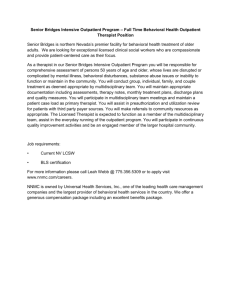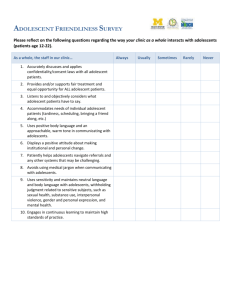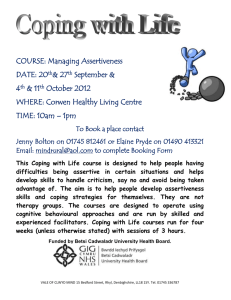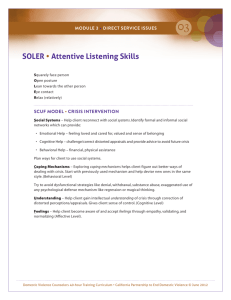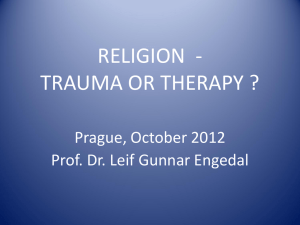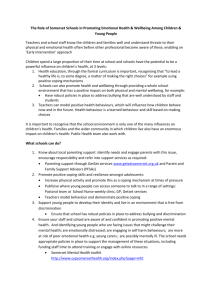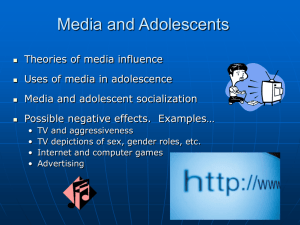Day Treatment – Elk River
advertisement
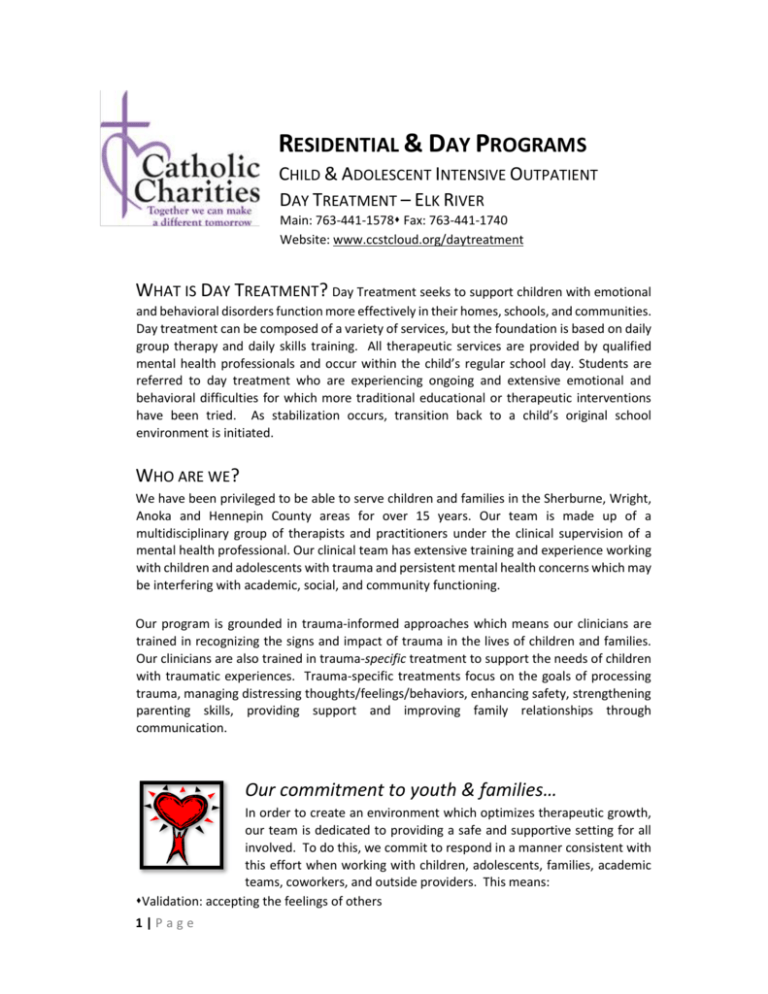
RESIDENTIAL & DAY PROGRAMS CHILD & ADOLESCENT INTENSIVE OUTPATIENT DAY TREATMENT – ELK RIVER Main: 763-441-1578 Fax: 763-441-1740 Website: www.ccstcloud.org/daytreatment WHAT IS DAY TREATMENT? Day Treatment seeks to support children with emotional and behavioral disorders function more effectively in their homes, schools, and communities. Day treatment can be composed of a variety of services, but the foundation is based on daily group therapy and daily skills training. All therapeutic services are provided by qualified mental health professionals and occur within the child’s regular school day. Students are referred to day treatment who are experiencing ongoing and extensive emotional and behavioral difficulties for which more traditional educational or therapeutic interventions have been tried. As stabilization occurs, transition back to a child’s original school environment is initiated. WHO ARE WE? We have been privileged to be able to serve children and families in the Sherburne, Wright, Anoka and Hennepin County areas for over 15 years. Our team is made up of a multidisciplinary group of therapists and practitioners under the clinical supervision of a mental health professional. Our clinical team has extensive training and experience working with children and adolescents with trauma and persistent mental health concerns which may be interfering with academic, social, and community functioning. Our program is grounded in trauma-informed approaches which means our clinicians are trained in recognizing the signs and impact of trauma in the lives of children and families. Our clinicians are also trained in trauma-specific treatment to support the needs of children with traumatic experiences. Trauma-specific treatments focus on the goals of processing trauma, managing distressing thoughts/feelings/behaviors, enhancing safety, strengthening parenting skills, providing support and improving family relationships through communication. Our commitment to youth & families… In order to create an environment which optimizes therapeutic growth, our team is dedicated to providing a safe and supportive setting for all involved. To do this, we commit to respond in a manner consistent with this effort when working with children, adolescents, families, academic teams, coworkers, and outside providers. This means: Validation: accepting the feelings of others 1|Page Openness: a willingness to listen Calm: grounded and authentic expression Curious: expressing a genuine interest through compassionate inquiry Structure: stable and consistent expectations and schedule Confidential: respect of privacy Safe: modeling of healthy boundaries WHO BENEFITS FROM DAY TREATMENT? Children and adolescents who: have a mental health diagnosis which interferes with school, home and community. are transitioning from a higher level of care (hospitalization/residential placement). would benefit from learning intensive coping and/or social skill training. are committed to attending regularly, as absences make relationship building difficult. have families committed to participate in family services. abstain from drug/alcohol use which seriously impairs readiness for therapeutic change. A dual-diagnosis program (chemical health + mental health) would be recommended in this case. WHAT IS REQUIRED FOR ADMISSION TO DAY TREATMENT? The diagnostic assessment: All programming begins with a required Diagnostic Assessment (a standardized interview which collects information related to a child’s overall history— including health, social, behavioral, trauma, school, family, and past interventions) to support medical necessity and to ensure individualized treatment for the child. Once accepted into the program, the full benefit of services becomes available, including individual therapy, group therapy, social and/or coping skill groups, clinical skill groups, transition/reintegration support, family therapy and continued care upon discharge (when available). Insurance: Catholic Charities submits request for payment to a caregiver’s insurance company. If a caregiver’s insurance does not cover Day Treatment services, we will assist the caregiver in reviewing all options available to their child. WHAT HAPPENS IN DAY TREATMENT? Participants receive group therapy and skills training each day. These services are grouped together in a three-hour block of time. Individual therapy and family therapy generally occur outside these hours. Students spend the remainder of their day in whatever academic programming is being provided by their home school district. Below is a full description of each available service: GROUP THERAPY: occurs DAILY Group therapy gives group members an opportunity to experience the following: altruism – giving to other members group cohesiveness – feeling connected to others interpersonal learning – learning from other members guidance – receiving help and advice 2|Page catharsis – releasing feelings and emotions identification – modeling after members or leader family reenactment – feeling as if one is in a family and learning from the experience self-understanding – gaining personal insight hope – feeling hopeful about one’s life universality – feeling that one is not alone and existential factors – coming to understand what life is about—the ebb and flow of living. [Source: Yalom, I.D. The Theory and Practice of Group Psychotherapy] SOCIAL & COPING SKILLS: occurs DAILY Children who have struggled with mental health long-term can sometimes lag in social skill development as compared to same-age peers. This developmental gap can interfere with success and comfort in relating to others. Social skill groups cover a wide range of social functioning and adaptive skills to strengthen the foundation for future social learning and improved social success. Coping skills are part of every treatment plan and provide a child the skills to manage their emotional state and stress symptoms more effectively. Some examples of practice areas include: healthy relationship skills, managing new and/or stressful situations, independent living skills, conflict resolution, assertiveness training, cooperative teamwork, problem solving, and stress management. CLINICAL SKILLS: Specialty group (frequency varies) Clinical skills groups are specialized groups facilitated by mental health professionals to target specific therapeutic topics directly related to individualized treatment goals. Participants are selected based on their diagnosis and perceived benefit. Some examples include targeted anxiety and depression management, grief/loss, anger management, and healthy relationships. INDIVIDUAL THERAPY: occurs WEEKLY Individual therapy addresses specific treatment goals and tracks progress as it relates back to the treatment plan. It also provides the child an opportunity to talk with their therapist outside the larger group setting. Individualized treatment planning, strategies and progress are explored and practiced during this time as well. Each child/adolescent has their own individual therapist in the program. FAMILY THERAPY & SKILLS: schedule & frequency vary Family therapy is an integral part of our program. Our approach is strengths-based and a collaborative partnership between caregiver and program staff is vital to the success of each child in the program. Family goals will be determined in partnership with the family and the child. Examples of common family goals include: Strengthening family relationships through communication and validation, decreasing undesirable behaviors in the child at home, reducing conflict among family members, and increasing the family’s sense of wellbeing. ADVOCACY/CASE MANAGEMENT: From start to end Each child/adolescent in the program receives case management services through their individual program therapist who collaborates with the family, academic and community providers to ensure a team approach to treatment. Case management can help to bridge communication gaps, provide connection to community or academic services and coordinate care prior to discharge from programming. Case management also commits to identifying resources and supports for the family by helping to build a support network within the children’s mental health community. 3|Page TRANSITION/RE-INTEGRATION SERVICES: Schedule & plans vary Our program offers the unique service of assisting in successful transition of a child out of day treatment with a gradual reintroduction of the child back into their mainstream environment. Possible supports include: providing visits for a child/adolescent who is apprehensive about reentering their academic environment, coordination with the academic team to ensure proven supports are in place, and support in connecting children with outside services and community activities. CONTINUED CARE: When eligible Continued care services are offered to children and families who have successfully discharged from programming and includes ongoing family therapy or individual therapy for the child to ensure a smooth transition to an outpatient provider. The length of continued care is designed to be a short term in order to bridge the gap between day treatment services and outpatient services and supports. Authorization through insurance is necessary to receive this service. HOW LONG IS DAY TREATMENT? Day Treatment services are considered transitional in nature, meaning that the primary goal is to stabilize a child’s functioning and build and maintain the skills needed to allow them to successfully transition to less intensive services. Length of program will depend on progress made with treatment goals and evidence to support that the child is able to sustain their progress even when new stressors are encountered. Transition planning begins early and is an ongoing effort between the therapeutic team, parents, community service providers, and the academic team. Typically children will transition to outpatient therapy services upon discharge from Day Treatment and referral support is then provided as part of the transition process. A thorough reintegration plan is created to assist in future planning and to ensure ongoing support for children transitioning to a lower level of care. CATHOLIC CHARITIES DAY TREATMENT PHILOSOPHIES & MODELS All of our services maintain evidence-based, strengths-based strategies and philosophies. We believe behavioral challenges provide teaching opportunities. Our goals for our clients are to: -Strengthen social interaction skills -Strengthen family relationships and understanding -Strengthen mood regulation and behavior management -Strengthen the understanding of mental health -Strengthen family advocacy skills -Strengthen a child’s sense of self-compassion – which involves mindfulness of one’s own thoughts and feelings, a sense of a common humanity and treating oneself kindly. Our Program uses well-established models in providing care to clients. One such model is the Circle of Courage® which focuses on positive youth development based on the belief of universal human needs for belonging, mastery, independence, and generosity. These are the foundations for psychological resilience and positive youth development. This model integrates the cultural wisdom of tribal peoples, the practice wisdom of professionals in their work with at-risk youth, and youth development research. 4|Page Another foundational concept we apply in our work is Resiliency and Health Realization. Researchers are finding the key to a happy and successful life is Resilience. Resilience is the ability to bounce back from life’s difficulties. In our program, Resiliency is a key principal in the work we do with children and adolescents. We challenge program participants to discover their own innate strength and wisdom, gain greater self-acceptance (selfcompassion), and in turn become better prepared and more willing to give back to others and to the community in positive ways. A third foundational concept we employ is based on research of the Search Institute which identifies 40 building blocks of healthy development—known as Developmental Assets® that help youth grow up to be healthy, caring, and responsible individuals. 5|Page OUR TREATMENT APPROACHES AND CURRICULUM The treatment approaches we employ are firmly grounded in evidencebased practices (EBP) – which are approaches that have been researched and provide solid evidence for producing positive outcomes with children and their families. Through research, certain treatment approaches are found to be more effective with certain mental health diagnoses and we practice parameter guidelines in implementing our treatment approaches with children and adolescents. Treatments Cognitive Behavioral Therapy (CBT) Trauma Focused Cognitive Behavioral Therapy (TF-CBT) – trauma specific treatment EMDR (Eye Movement Desensitization and Reprocessing) –trauma specific treatment Thought Field Therapy Exposure Therapy Behavior Therapy Psychoeducation Anger Coping Therapies Brief Strategic Family Therapy (BSFT) Functional Family Therapy (FFT) Relaxation Therapy (guided imagery, progressive muscle relaxation, regulated breathing, mindfulness, meditation, yoga) Self-monitoring (feelings identification, insight logs, journaling, scaling questions) Individual and family therapies targeting communication skills, interaction skills, and behavior modification. Curriculum: A wide range of social skills and therapy curriculum is utilized by the clinical team. Our program avoids the ‘one size fits all’ approach in working toward goals with participants as we see each child as a unique individual. Interventions and curriculum are chosen and tailored to suit the unique needs of the child, i.e. symptoms, experiences, client preferences, developmental level, etc. Some examples of evidenced-based curriculum that we use include: Why Try®, Coping Cat for Anxiety, Adolescent Coping with Depression (CWD-A), and Coping with Stress (CWS). ASSESSMENTS & OUTCOME MEASURES We use specific and standardized assessments and outcome measures in our work with children and families in an effort to achieve the best possible results for children in the program. Assessments help to measure current symptoms related to diagnosis and inform the therapist on status changes of symptoms. Outcome measures create a picture of a child’s progress and growth and may help to inform choices with ongoing treatment goals. The following are a sample of assessment & outcome measures: Child & Adolescent Severity Instrument (CASII), Strengths & Difficulties Questionnaire (SDQ), Global Assessment of Individual Needs Survey (GAINS), Beck Anxiety & Depression Scales (BDI & BAI), Patient Health Questionnaire (PHQ-9). 6|Page CHILD & ADOLESCENT INTENSIVE OUTPATIENT DAY TREATMENT OUR TEAM Our therapeutic team of Mental Health Professionals and Mental Health Practitioners are of all faiths and backgrounds; are dynamic and dedicated and love what they do. Nancy Craft, MS is a licensure-track therapist with 26 years of experience in the field working with families and children in intensive outpatient day treatment and in-home settings. Nancy is trained in EMDR, an evidence based trauma specific treatment and has extensive experience with group work for adolescents and children struggling with significant mental health concerns. nancy.craft@ccstcloud.org 763-441-1578 ext.3 Joy Notch, MA, LMFT is a licensed marriage and family therapist with 11 years of experience working with children and adolescents in schools, day treatment and partial hospitalization settings. Joy is trained in EMDR, an evidence based trauma specific treatment and specializes in working with elementary and middle school-age clients struggling with significant mental health and behavioral concerns. Joy primarily works clients in grades K-5. joy.notch@ccstcloud.org 763-441-1578 ext.4 Tanya Lambert, MA is a licensure track therapist with 22 years of experience in the field of mental health and traumatic brain injury, working in day treatment and group home settings. Tanya is trained in TF-CBT, an evidence based trauma specific treatment and generally focuses on middle-school age client groups. tanya.lambert@ccstcloud.org. 763-441-1578 ext.5 Kate Eiden, BSW is a Mental Health Practitioner with 8 years of experience providing coping and social skill training to children and adolescents with mental health concerns. Kate is pursuing her graduate degree in education. Kate teaches social and coping skills to all program participants and provides support to the therapy team when needed. kate.eiden@ccstcloud.org. Holly Fanning, MS, LSC is a Licensed School Counselor and a Mental Health Practitioner with 7 years of experience providing coping and social skill training to children and adolescents with significant mental health concerns. Holly teaches social and coping skills to all program participants and provides support to the therapy team when needed. holly.fanning@ccstcloud.org Sheri LaClare – Sheri is our program’s Administrative Secretary with over 7 years in the program. She manages all administrative duties required to keep things running smoothly. sheri.laclare@ccstcloud.org. 763-441-1578 ext.6 Sheila Selinsky, MA, LMFT is the program Clinical Supervisor with 15 years of experience providing therapy and clinical supervision in the field of children’s mental health. Sheila is trained in EMDR and is a Board-approved supervisor with the MN Board of Marriage and Family Therapy and the MN Board of Behavioral Health and Therapy. sheila.selinsky@ccstcloud.org. 763-441-1578 ext. 7 7|Page

